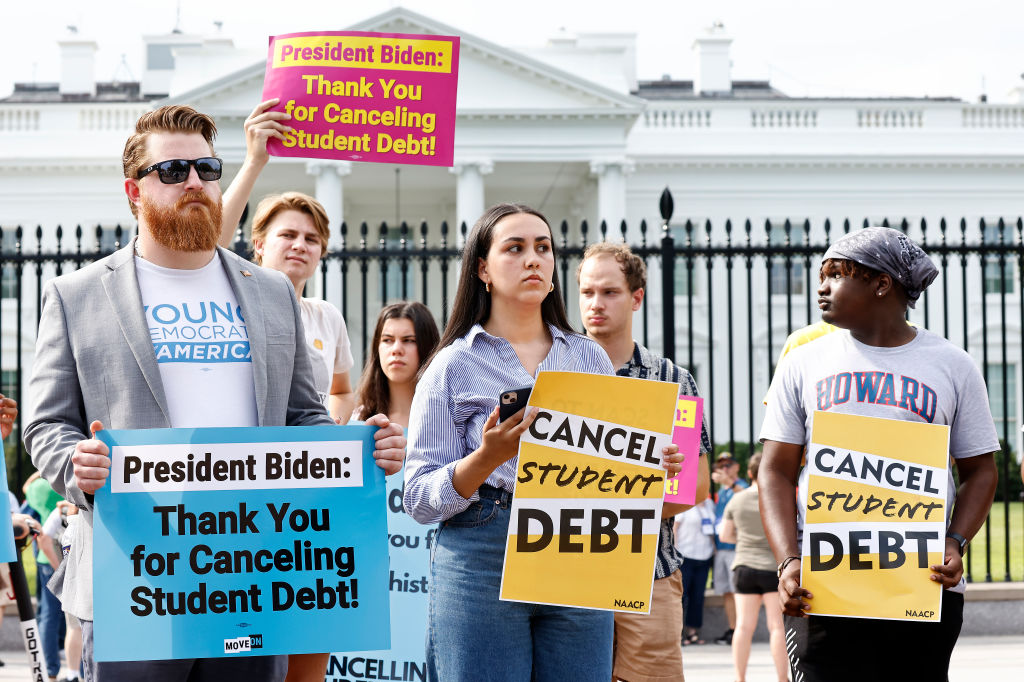In a major setback for President Joe Biden, the US Supreme Court has thrown out his plan to alleviate the burden of student debt on more than 40 million individuals. The court ruled 6-3 along ideological lines, favoring six Republican-led states that sued to challenge the program. This initiative considered one of Biden’s key proposals, was deemed to exceed the president’s power by the justices.
The student debt relief plan, estimated to cost $400 billion over a span of 30 years, aimed to significantly reduce the financial burden on borrowers. However, Chief Justice John Roberts, writing on behalf of the court, stated that the administration was overstepping its boundaries and “seizing the power of the legislature” by attempting to cancel such a substantial amount of student debt.
This ruling not only strips Biden of a notable accomplishment but also puts pressure on him to explore alternative methods of debt cancellation. The president may face renewed calls from lawmakers and advocates for loan relief to seek different legal justifications. As the resumption of student loan payments looms in late August, millions of individuals could find themselves falling behind on their debt obligations.
See also: Biden’s Student Loan Relief Plan in Chaos: Experts Suggest Untested Plan B
Despite the setback, proponents of the relief plan, such as US Senator Elizabeth Warren, a Democrat from Massachusetts, remain hopeful. Warren emphasized that the fight is not over and urged Biden to utilize other tools at his disposal to address the issue of student debt.
Ready to find your next big challenge in the legal field? Look no further than BCG Attorney Search.
The dissenting opinion came from the three liberal justices who argued that the states lacked the legal standing to challenge the loan relief plan. They contended that Congress had authorized the forgiveness program and, therefore the court’s involvement was unnecessary. Justice Elena Kagan, writing for the dissenters, expressed concern that the court was exceeding its proper role in governing the nation.
This ruling reflects a trend of the conservative-dominated Supreme Court challenging Biden’s agenda on multiple fronts. The court previously prevented Biden from blocking evictions during the pandemic and mandating Covid vaccines or regular tests for workers. Additionally, the justices have curtailed the Environmental Protection Agency’s authority to address climate change and protect wetlands.
Under Biden’s proposal, certain borrowers earning less than $125,000 per year ($250,000 for households) would have been eligible for the forgiveness of up to $20,000 in federal loans. However, critics, including Republican National Committee Chairwoman Ronna McDaniel, argued that the plan unfairly penalized those who had already paid off their loans, saved for college, or pursued different career paths.
The Biden administration had maintained that the student loan program was authorized under the 2003 Heroes Act, which grants the education secretary special powers in response to national emergencies. The act permits the secretary to “waive or modify” provisions to ensure that debtors are not financially worse off due to such emergencies. Chief Justice Roberts dismissed this argument, stating that the law did not provide the education secretary with the authority to overhaul the statute.
Roberts invoked the “major questions doctrine,” a legal concept employed by the current court to limit the power of federal agencies and departments. The doctrine requires clear congressional authorization before executive actions with significant political and economic ramifications can be undertaken.
The six states—Nebraska, Missouri, Arkansas, Iowa, Kansas, and South Carolina—along with two borrowers challenged the program in separate cases. The court determined that the borrowers lacked standing, but the states were granted standing due to the impact on the Missouri Higher Education Loan Authority (MOHELA). MOHELA, a nonprofit entity created by the state, is required by law to contribute to a fund for public college projects. Roberts argued that the plan would harm MOHELA’s revenue, directly affecting its ability to support Missouri college students and consequently causing injury to the state itself.
However, Justice Kagan criticized this reasoning, asserting that the states had no personal stake in the loan forgiveness program. She characterized them as ideological plaintiffs who simply disagreed with the plan without suffering any direct harm as a result of the education secretary’s decision.
The Supreme Court’s decision has significant implications for Biden’s student loan relief efforts. As the president explores alternative avenues to address the issue, the fate of millions of borrowers and the future of student loan policies hang in the balance.
Don’t be a silent ninja! Let us know your thoughts in the comment section below.

